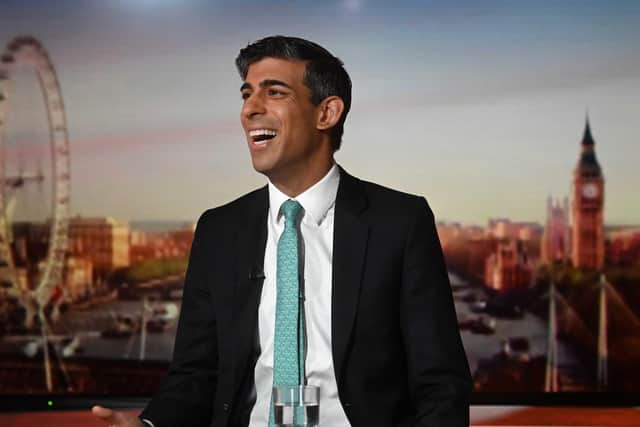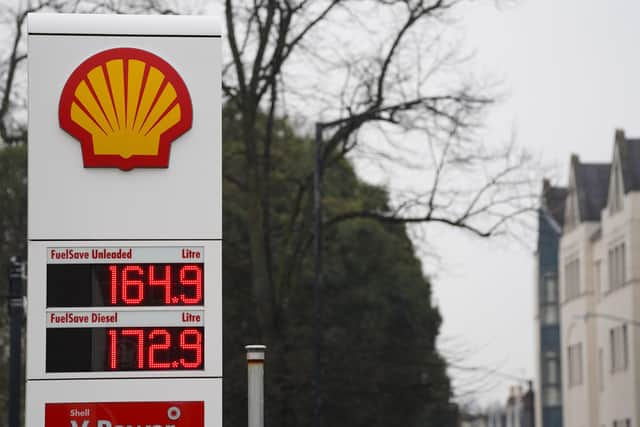Why Rishi Sunak must halt this energy rip-off in Spring Statement – Andrew Vine
On top of a 50 per cent increase in fuel costs, which amounts to about £600 for my very modestly-sized home, my supplier, Eon Next, is increasing its daily standing charge for my electricity by an eye-watering 72 per cent, from £115 a year to £198.
Advertisement
Hide AdAdvertisement
Hide AdThe other big energy companies are doing likewise, and in the process demonstrating a greed and callousness towards hard-pressed customers, the poorest of whom face a choice between keeping warm and buying food. Under cover of the spike in wholesale gas prices, they have slipped through the increase in standing charges, which are not regulated by Ofgem.


There is no possible justification for this nakedly cynical exercise to screw yet more profit out of customers who can ill-afford higher bills from next month.
An email to Eon Next enquiring why standing charges are going up by such a whopping margin has been greeted with the usual mealy-mouthed nonsense about putting customers’ welfare first, presumably generated by an algorithm, which helpfully included contact details for Citizens Advice if I was worried about paying the bill. Gee, thanks.
For a far more clear-eyed view of what’s going on with energy prices, it’s much better to turn to Richard Murphy, professor of accounting practice at the University of Sheffield Management School, who posted succinctly on Twitter last week: “You’re about to be ripped off, massively.”
Advertisement
Hide AdAdvertisement
Hide AdProf Murphy points out that only 36 per cent of our bills amounts to the actual cost of energy. The rest is taken up by tax, profits, environmental schemes, billing, customer services and delivery.


So if the energy companies were being straight with us, which they are not, even a huge hike in wholesale gas prices should not send the overall bill soaring by an average of 50 per cent. A crisis for the poorest consumers is going to result in a bonanza for the suppliers.
This time next year, they are likely to be posting record profits, whilst this newspaper and others will be full of stories about families freezing through the winter because they dared not put the heating on, children turning up hungry at school because there was no money for food at home, or old people being rushed to hospital suffering from hypothermia.
Former Tory Cabinet minister Justine Greening wrote here on Saturday of the devastating impact increased energy bills will have on households which are barely managing as it is. She was spot-on in her assessment. Yet I doubt her former colleague Chancellor Rishi Sunak will take the energy companies to task when he delivers his Spring Statement tomorrow.
Advertisement
Hide AdAdvertisement
Hide AdHe should. It’s not enough for him and other ministers to express regret about the cost of living crisis that has something as fundamental as staying warm at its heart. Nor will the £150 energy bill rebate due next month do enough to ease the worries of many.


In addition to the strategic review of how and where Britain gets the energy it needs in the wake of Vladimir Putin’s war on Ukraine, there also needs to be a long, hard look taken at the companies we are all obliged to rely on for gas and electricity.
Prof Murphy’s assertion that we are being systematically ripped off must be taken seriously and addressed against the backdrop of an abruptly changed world energy market.
The people of this country who are demonstrating such a generosity of spirit to refugees from war deserve better than to become victims of profiteering.
Advertisement
Hide AdAdvertisement
Hide AdA perfect storm is about to engulf the most vulnerable households in Yorkshire and beyond. Besides gas and electricity prices and the exorbitant cost of petrol and diesel, food bills are increasing fast and may go even higher as supplies of grain from Ukraine are jeopardised or even cease altogether.
There are measures Mr Sunak can take tomorrow to help. Reducing fuel duty and postponing the increase in national insurance are two of them, and he should do both.
We’ve just come through one national emergency with Covid, when only Government intervention saved businesses and livelihoods.
Whether the Chancellor admits it or not, the cost of living crisis amounts to another emergency for many in Britain and he must intervene again.
Advertisement
Hide AdAdvertisement
Hide AdSupport The Yorkshire Post and become a subscriber today. Your subscription will help us to continue to bring quality news to the people of Yorkshire. In return, you’ll see fewer ads on site, get free access to our app, receive exclusive members-only offers and access to all premium content and columns. Click here to subscribe.
Comment Guidelines
National World encourages reader discussion on our stories. User feedback, insights and back-and-forth exchanges add a rich layer of context to reporting. Please review our Community Guidelines before commenting.